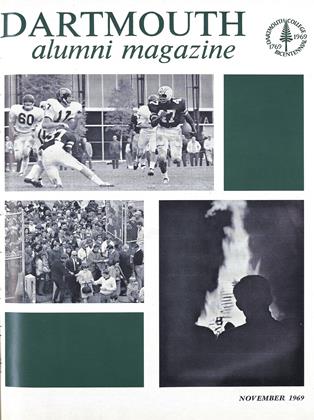Edited by David R. Godschalk '53 of the University of North Carolina, the March issue of the Journal of the American Institute of Planners concentrates on "The Cities, The Black and the Poor." Authors, black and white, practitioners and scholars offer a wide range of interpretations and proposals concerned with cultural problems of class and race, possibilities for constructive new public policies, and styles of planning for effective environmental reform. In the July issue treating "Planning and Citizen Participation," writers analyze the nature and causes of stress and frustration in participatory democracy in urban planning. In his introduction Mr. Godschalk asks his key question: can "the flourishing institution of citizen participation, operationalized with federal encouragement, be turned off without a bitter counterreaction from the neighborhoods?"
Wilton S. Sogg '56, a lawyer in the firm of Gottfied, Ginsberg, Guren & Merritt of Cleveland, is co-author of ConstitutionalLaw, Torts, and Contracts, three volumes in the 1969 revised editions of Smith's Review in the Legal Gem Series, published by the West Publishing Company of St. Paul, Minn. Chester H. Smith was the late Professor of Law, University of Arizona. The series of 18 books providing brief summaries of legal principles in each major subject in the law school curriculum is particularly designed for college, law-school, and bar examinations. Mr. Sogg is Adjunct Professor of Law, Cleveland-Marshall Law School, and his coauthor is Howard M. Rossen, Director of the Ohio Bar Review and Writing Seminar.
Constitutional Law includes all significant United States Supreme Court Cases and other developments through January 1969 with a table of recent developments. Torts is updated with new chapters on products liability, immunity, right of privacy, nuisance and damages, with important new de- cisions, trends, and developments in all traditional tort areas, and special emphasis on techniques of analysis. Contracts includes new material on the restatement, second, contracts, the uniform commercial code, the parol evidence rule, unconscionability, and damages, with important new decisions, trends, and developments in all traditional areas of contract law, with special emphasis on techniques of analysis.
 View Full Issue
View Full Issue
More From This Issue
-
 Feature
FeatureBlack Studies: A Beginning
November 1969 By SUSAN LIDDICOAT -
 Feature
FeatureThe Most Dangerous Gap of All
November 1969 By THOMAS J. McINTYRE '37 -
 Feature
FeatureThe Dean Charts a Course
November 1969 -
 Feature
FeatureA Conclave of Noted Scientists
November 1969 -
 Feature
FeatureCOED EXCHANGE
November 1969 -
 Article
ArticleWith the Big Green Teams
November 1969
Books
-
 Books
BooksLEPROSY in EUROPE
June 1929 -
 Books
BooksAlumni Articles
FEBRUARY 1967 -
 Books
BooksAlumni Articles
APRIL 1971 -
 Books
BooksOf Special Note
MAY 1971 By J.H. -
 Books
BooksCONTRIBUTIONS TO THE GEOLOGY OF URANIUM AND THORIUM:
October 1956 By JOHN B. LYONS -
 Books
BooksPHILIP THE FAIR AND BONIFACE VIII: STATE VS. PAPACY
JUNE 1967 By JOHN R. WILLIAMS


